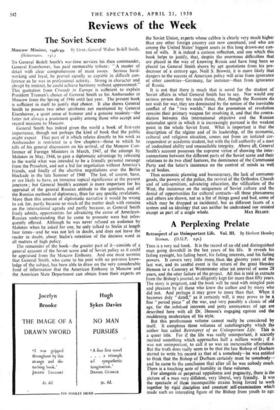Reviews of the Week
The Soviet Scene
Moscow Mission, 1946-49. By Lieut.-General Walter Bedell Smith. (Heinemann. iss.)
To General Bedell Smith's war-time services his then commander, General Eisenhower, has paid memorable tribute: " A master of detail with clear comprehension of main issues. Serious hard- working and loyal, he proved equally as capable in difficult con- ference as he was in professional activity. Strong in character and abrupt by instinct, he could achieve harmony without appeasement." This quotation from Crusade in Europe is sufficient to explain President Truman's choice of General Smith as his Ambassador in Moscow from the Spring of 1946 until last year. The present book is sufficient in itself to justify that choice. It also shows General Smith to possess two other attributes not mentioned by General Eisenhower, a quiet sense of humour and a genuine modesty—the latter not always a prominent quality among those who accept and record missions to Moscow.
General Smith has indeed given the world a book of first-rate importance, though not perhaps the kind of book that the public might expect. That part of it which relates directly to his work as Ambassador is restricted to a few chapters—those in which he tells of his general discussions on his arrival, of the Moscow Con- ference of Foreign Ministers in March, 1947, of the attempt by Molotov in May, 1948, to gain a diplomatic advantage by releasing to the world what was intended to be a friendly personal message from the President, and not a bid for negotiation without America's friends, and finally of the abortive negotiations over the Berlin blockade in the late Summer of 1948 The last, of course, have, or are likely to have, an immense topical significance at the present juncture; but General Smith's account is more important for his appraisal of the general Russian attitude to the question, and of the Russian methods of diplomacy, than for any specific revelations. More than this amount of diplomatic narrative it would be wrong to ask for, partly because so much of the matter dealt with remains on the international agenda and partly because, as General Smith freely admits, opportunities for advancing the cause of American- Russian understanding that he came to promote were but infre- quently offered. Although he was never refused an audience by Molotov when he asked for one, he only talked to Stalin at length four times—and he was not left in doubt, and does not leave the reader in doubt, about Stalin's retention of the decisive word in all matters of high policy. The remainder of the book—the greater part of it—consists of a general account of the Soviet scene and of Soviet policy as it could be appraised from the Moscow Embassy. And one must surmise that General Smith, who came to his post with no previous know- ledge of the subject, has been able to draw on the very considerable fund of information that the American Embassy in Moscow and the American State Department can obtain from their experts on the Soviet Union, experts whose calibre is clearly very much higher than any other foreign country can now command, and who are among the United States' biggest assets in this long drawn-out con- test of wills. It is indeed a curious reflection, and one which this book helps to justify, that, despite the enormous difficulties that are placed in the way of knowing Russia and have long been so placed (as General Smith shows by apt quotations from his pre- decessor of a century ago, Neill S. Brown), it is more likely that dangers to the success of American policy will arise from ignorance of other countries—Germany, for instance—than from ignorance of Russia.
It is not that there is much that is novel for the student of Soviet affairs in what General Smith has to say. Nor would any serious person deny his main thesis, that, though the Russians do not wish for war, they are dominated by the notion of the inevitable conflict of the " two worlds," that the promotion of revolution remains their primary weapon for resolving it, and that the contra- diction between this international objective and the Russian nationalist spirit in which it is increasingly pursued is the weakest point in the whole Soviet front. What is important is that the description of the regime and of its leadership, of the economic, cultural and religious situation, comes not from an isolated cor- respondent or academic student, but with the full authority of a man of undoubted ability and unassailable integrity. Above all, General Smith's account possesses the supreme virtue of showing the inter- connections between the different parts of the Soviet scene and their relations to its two chief features, the dominance of the Communist Party and the latter's insistence on the control of minds as well as of bodies.
Thus economic planning and bureaucracy, the lack of consumer goods, the powers of the police, the revival of the Orthodox Church and of anti-semitism, advancing education, the vilification of the West, the insistence on the uniqueness of Soviet culture and the denial of opportunities for cultural contacts—all these phenomena and others are shown, not as a list of things good and bad, some of which may be dropped as incidental, but as different facets of a system and an ideology that can neither be understood nor resisted
except as part of a single whole. MAX BELOFF.






































 Previous page
Previous page